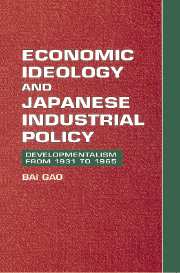Book contents
- Frontmatter
- Contents
- Acknowledgments
- List of abbreviations
- Note on Japanese usage
- 1 Introduction
- 2 The Ideology of Japanese developmentalism
- 3 The managed economy
- 4 Priority production
- 5 Promoting exports
- 6 High growth and liberalization
- 7 The institutional environment of economic reasoning
- Epilogue: Japanese developmentalism in historical perspective
- References in English
- References in Japanese
- Index
6 - High growth and liberalization
Published online by Cambridge University Press: 29 March 2010
- Frontmatter
- Contents
- Acknowledgments
- List of abbreviations
- Note on Japanese usage
- 1 Introduction
- 2 The Ideology of Japanese developmentalism
- 3 The managed economy
- 4 Priority production
- 5 Promoting exports
- 6 High growth and liberalization
- 7 The institutional environment of economic reasoning
- Epilogue: Japanese developmentalism in historical perspective
- References in English
- References in Japanese
- Index
Summary
High growth and liberalization was the leading paradigm in Japanese industrial policy during the 1960s. Under this paradigm, Japanese developmentalism accomplished its transition to the trade version, and both the ideologies and institutions of the contemporary Japanese economic system were patterned.
The 1950s was still an early stage in the transition of Japanese developmentalism to the trade version for three reasons. First, the Yoshida strategy was resisted by both conservatives and progressives, and the country was deeply divided on the issue of rearmament. Second, both management and labor still remained skeptical about the productivity movement, and the agenda of technological innovation had not received full support. Third, although Japan began to engage in international trade, the Japanese economy was still operated in a semiopen international environment because Japan's domestic markets were still extremely protected and the bureaucratic control over the economy was still quite strong.
Japanese developmentalism in the 1960s was driven by the Pax Americana in two significant ways. First, the extension of the Japan-U.S. security treaty greatly escalated the political tension between the conservatives and the progressives, creating a major political crisis in Japan in 1960. After this crisis, however, the Japanese changed “political season” to “economic reason.” From then on, as Sasaki Takashi (1991:2) points out, Japan ended its attempts to redefine its position in the world system dominated by the United States; the nation “turned inward and made economic growth and the pursuit of affluence its highest priorities.”
- Type
- Chapter
- Information
- Economic Ideology and Japanese Industrial PolicyDevelopmentalism from 1931 to 1965, pp. 225 - 279Publisher: Cambridge University PressPrint publication year: 1997



